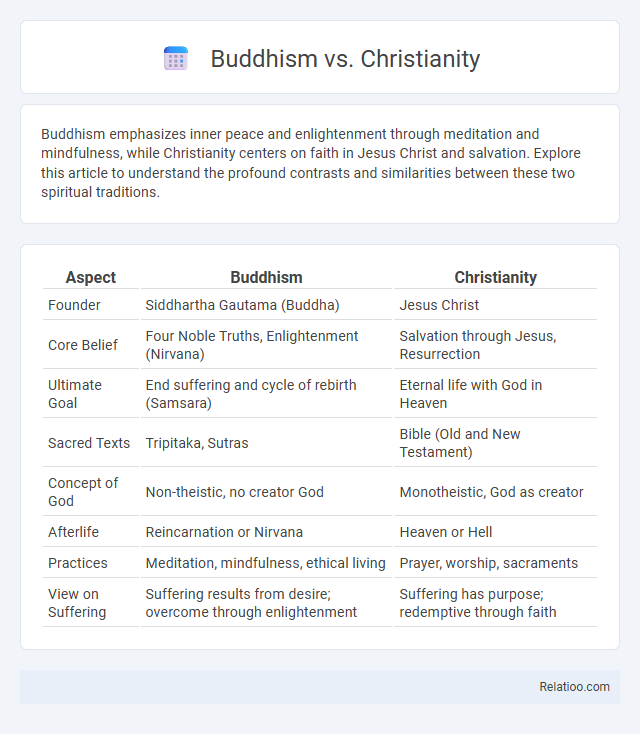Buddhism emphasizes inner peace and enlightenment through meditation and mindfulness, while Christianity centers on faith in Jesus Christ and salvation. Explore this article to understand the profound contrasts and similarities between these two spiritual traditions.
Table of Comparison
| Aspect | Buddhism | Christianity |
|---|---|---|
| Founder | Siddhartha Gautama (Buddha) | Jesus Christ |
| Core Belief | Four Noble Truths, Enlightenment (Nirvana) | Salvation through Jesus, Resurrection |
| Ultimate Goal | End suffering and cycle of rebirth (Samsara) | Eternal life with God in Heaven |
| Sacred Texts | Tripitaka, Sutras | Bible (Old and New Testament) |
| Concept of God | Non-theistic, no creator God | Monotheistic, God as creator |
| Afterlife | Reincarnation or Nirvana | Heaven or Hell |
| Practices | Meditation, mindfulness, ethical living | Prayer, worship, sacraments |
| View on Suffering | Suffering results from desire; overcome through enlightenment | Suffering has purpose; redemptive through faith |
Core Beliefs: Buddhism and Christianity
Buddhism centers on the Four Noble Truths and the Eightfold Path, emphasizing personal enlightenment through mindfulness, ethical conduct, and detachment from desire. Christianity is based on the belief in one God, the divinity of Jesus Christ, salvation through faith, and the teachings of love and forgiveness found in the Bible. Both religions address suffering and morality but differ fundamentally in their views on God, salvation, and the afterlife.
Historical Origins and Founders
Buddhism originated in the 5th century BCE in India, founded by Siddhartha Gautama, known as the Buddha, who taught the path to enlightenment through the Four Noble Truths and the Eightfold Path. Christianity began in the 1st century CE in the Roman province of Judea, founded by Jesus of Nazareth, whose teachings centered on love, forgiveness, and salvation through faith in God. Both religions emerged from distinct historical and cultural contexts, with Buddhism rooted in Indian spiritual traditions and Christianity developing from Jewish messianic expectations.
Concepts of God and Divinity
Buddhism centers on the concept of enlightenment and the cessation of suffering without emphasizing a creator God, focusing instead on personal spiritual development and inner peace. Christianity is rooted in the belief in one omnipotent, omniscient God who is both creator and redeemer, offering salvation and eternal life through faith in Jesus Christ. Your understanding of divinity may differ significantly between these traditions, as Buddhism emphasizes a non-theistic path while Christianity affirms a personal, relational God.
Sacred Texts and Scriptures
Buddhism centers on texts like the Tripitaka and Mahayana Sutras, which guide followers through teachings on enlightenment and the path to Nirvana. Christianity emphasizes the Bible, comprising the Old and New Testaments, revealing the life and teachings of Jesus Christ, foundational to Christian faith and practice. Your understanding of religious beliefs deepens by exploring these sacred scriptures, which shape the doctrines, rituals, and moral values within each tradition.
Path to Salvation or Enlightenment
Buddhism teaches the Eightfold Path as a practical guide to achieve Nirvana, emphasizing meditation, ethical conduct, and wisdom to escape suffering and rebirth. Christianity centers on salvation through faith in Jesus Christ, grace, and the acceptance of divine forgiveness to attain eternal life with God. Religious beliefs broadly vary, but many share a focus on adherence to spiritual principles or divine commandments as essential steps toward salvation or enlightenment.
Rituals and Worship Practices
Buddhism emphasizes meditation, chanting, and offerings as core rituals that cultivate mindfulness and compassion, while Christianity centers on sacraments like baptism and communion alongside prayer and church services to strengthen faith and community. Religious belief shapes these distinct worship practices, reflecting deeper theological differences such as Buddhism's focus on enlightenment and Christianity's emphasis on salvation through Jesus Christ. Your understanding of these rituals can enhance interfaith respect and personal spiritual growth.
Views on Life After Death
Buddhism teaches reincarnation, emphasizing the cycle of birth, death, and rebirth until achieving Nirvana, a state free from suffering. Christianity believes in eternal life after death, with souls destined for heaven or hell based on faith and moral conduct. Religious beliefs about the afterlife vary widely, but both traditions address themes of judgment, moral consequences, and ultimate spiritual fulfillment.
Ethical Teachings and Moral Principles
Buddhism emphasizes the Four Noble Truths and the Eightfold Path, promoting compassion, non-attachment, and mindfulness to reduce suffering and cultivate ethical living. Christianity centers on the teachings of Jesus Christ, highlighting love, forgiveness, and the Ten Commandments as moral guidelines to align Your life with God's will. Both religions provide distinct ethical frameworks rooted in spiritual beliefs, guiding adherents toward moral integrity and purposeful conduct within their communities.
Influence on Society and Culture
Buddhism fosters a culture of mindfulness, compassion, and non-violence, significantly shaping social ethics and meditation practices across Asia. Christianity influences Western civilization through its promotion of charity, social justice, and the establishment of educational and healthcare institutions. Both religions impact societal norms and cultural rituals, while broader religious beliefs collectively shape global values, community cohesion, and diverse cultural traditions.
Key Differences and Similarities
Buddhism centers on the Four Noble Truths and the Eightfold Path as a guide to enlightenment without reliance on a creator god, while Christianity is founded on faith in Jesus Christ as the Son of God and emphasizes salvation through grace. Both religions promote moral living, compassion, and the importance of community, yet their approaches to the afterlife differ, with Buddhism advocating reincarnation and nirvana, whereas Christianity teaches resurrection and eternal life in heaven or hell. Religious belief more broadly encompasses diverse systems of spirituality and worship, uniting these traditions through the human quest for meaning, ethical conduct, and connection to the divine or ultimate reality.

Infographic: Buddhism vs Christianity
 relatioo.com
relatioo.com